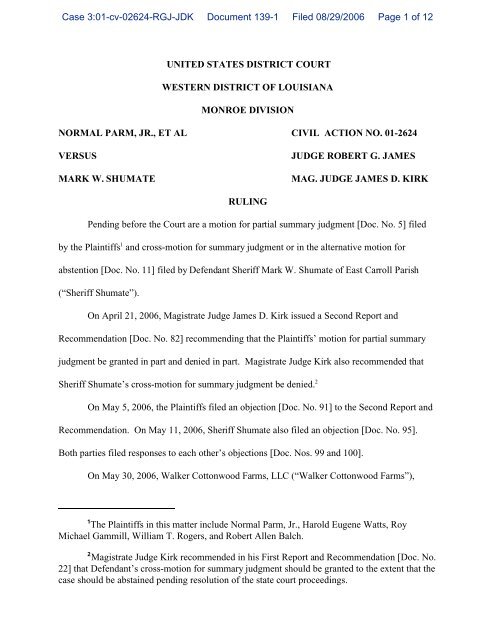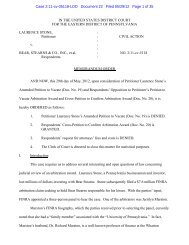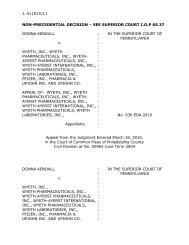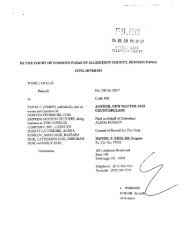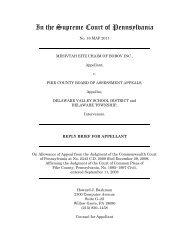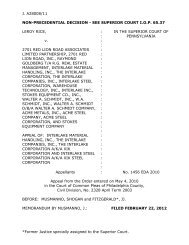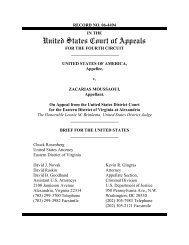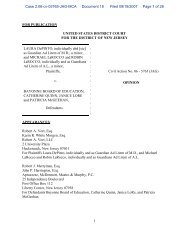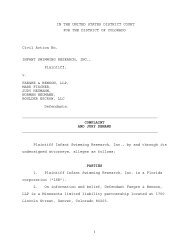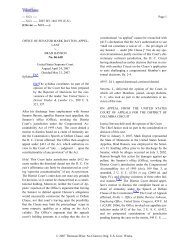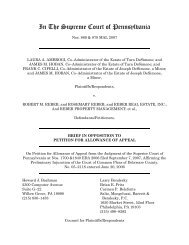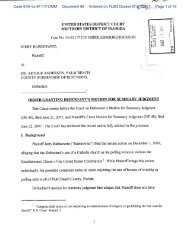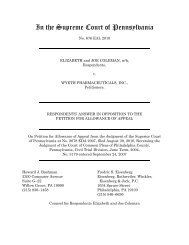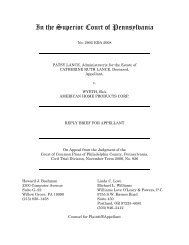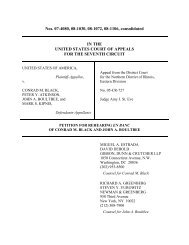Parm v. Shumate - How Appealing
Parm v. Shumate - How Appealing
Parm v. Shumate - How Appealing
You also want an ePaper? Increase the reach of your titles
YUMPU automatically turns print PDFs into web optimized ePapers that Google loves.
Case 3:01-cv-02624-RGJ-JDK Document 139-1 Filed 08/29/2006 Page 1 of 12<br />
UNITED STATES DISTRICT COURT<br />
WESTERN DISTRICT OF LOUISIANA<br />
MONROE DIVISION<br />
NORMAL PARM, JR., ET AL CIVIL ACTION NO. 01-2624<br />
VERSUS JUDGE ROBERT G. JAMES<br />
MARK W. SHUMATE MAG. JUDGE JAMES D. KIRK<br />
RULING<br />
Pending before the Court are a motion for partial summary judgment [Doc. No. 5] filed<br />
by the Plaintiffs 1 and cross-motion for summary judgment or in the alternative motion for<br />
abstention [Doc. No. 11] filed by Defendant Sheriff Mark W. <strong>Shumate</strong> of East Carroll Parish<br />
(“Sheriff <strong>Shumate</strong>”).<br />
On April 21, 2006, Magistrate Judge James D. Kirk issued a Second Report and<br />
Recommendation [Doc. No. 82] recommending that the Plaintiffs’ motion for partial summary<br />
judgment be granted in part and denied in part. Magistrate Judge Kirk also recommended that<br />
Sheriff <strong>Shumate</strong>’s cross-motion for summary judgment be denied. 2<br />
On May 5, 2006, the Plaintiffs filed an objection [Doc. No. 91] to the Second Report and<br />
Recommendation. On May 11, 2006, Sheriff <strong>Shumate</strong> also filed an objection [Doc. No. 95].<br />
Both parties filed responses to each other’s objections [Doc. Nos. 99 and 100].<br />
On May 30, 2006, Walker Cottonwood Farms, LLC (“Walker Cottonwood Farms”),<br />
1 The Plaintiffs in this matter include Normal <strong>Parm</strong>, Jr., Harold Eugene Watts, Roy<br />
Michael Gammill, William T. Rogers, and Robert Allen Balch.<br />
2 Magistrate Judge Kirk recommended in his First Report and Recommendation [Doc. No.<br />
22] that Defendant’s cross-motion for summary judgment should be granted to the extent that the<br />
case should be abstained pending resolution of the state court proceedings.
Case 3:01-cv-02624-RGJ-JDK Document 139-1 Filed 08/29/2006 Page 2 of 12<br />
successor in title to Walker Lands, Inc. (“Walker Lands”), filed an amicus curiae brief [Doc. No.<br />
102] in support of Sheriff <strong>Shumate</strong>’s objections to the Second Report and Recommendation.<br />
On June 28, 2006, an amicus curiae brief [Doc. No. 116] was filed by numerous fishing<br />
organizations in support of the Plaintiffs’ objections to the report. 3<br />
On July 27, 2006, an amicus curiae brief [Doc. No. 134] was filed by the Edward Wisner<br />
Donation in support of Sheriff <strong>Shumate</strong>’s objections to the report.<br />
For the following reasons, the Court ADOPTS IN PART AND DECLINES TO ADOPT<br />
IN PART the findings and conclusions set forth in the Magistrate Judge’s Report and<br />
Recommendation.<br />
I. FACTS AND PROCEDURAL HISTORY 4<br />
The Plaintiffs bring this instant action against Sheriff <strong>Shumate</strong> seeking a declaratory<br />
judgment, injunctive relief, and damages under 42 U.S.C. § 1983 and Louisiana state law. The<br />
Plaintiffs sued Sheriff <strong>Shumate</strong> in his official capacity claiming that they were arrested without<br />
probable cause for fishing and hunting on waters of the Mississippi River, which covered Walker<br />
3 These organizations include the Louisiana Crawfish Producers Association, Arkansas<br />
State Bass Federation, Big Sun Bass Masters of Bellview Florida, Maple Bassmasters of Florida,<br />
Blackhawk Bassmasters of Illinois, Bardstown Bassmasters of Kentucky, Kentucky State Bass<br />
Federation, Louisiana State Bass Federation, Louisiana Wildlife Federation, Rowa of Louisiana,<br />
Minnesota State Bass Federation, River Rats Bassmasters of Minnesota, Mississippi Bass<br />
Federation Nation, Western Main Anglers, Yankee Bassers Bass Club of Maine, and the<br />
Pennsylvania Bass Federation, Inc.<br />
4 Magistrate Judge Kirk has already succinctly characterized the facts and procedural<br />
history of this case in his Second Report and Recommendation. The Court will incorporate<br />
portions of Magistrate Judge Kirk’s factual background and procedural history in this Ruling.<br />
2
Case 3:01-cv-02624-RGJ-JDK Document 139-1 Filed 08/29/2006 Page 3 of 12<br />
Cottonwood Farms’ 5 property during periodic flooding. 6<br />
On August 22, 2002, Magistrate Judge Kirk issued his first Report and Recommendation<br />
[Doc. No. 22] recommending that this case be stayed pending the outcome of state court<br />
litigation in Walker Lands, Inc. v. East Carroll Parish Police Jury, 38,367-CA (La. App. 2 Cir.<br />
4/14/04); 871 So.2d 1258 (“Walker Lands”). On October 29, 2002, this Court adopted<br />
Magistrate Judge Kirk’s Report and Recommendation and stayed the case. [Doc. No. 27]. On<br />
July 9, 2003, the United States Court of Appeals for the Fifth Circuit affirmed this Court’s<br />
decision to stay the case. [Doc. No. 32].<br />
A. State Court Decision<br />
In the Walker Lands’ case, Walker Lands originally filed suit against the East Carroll<br />
Parish Police Jury to enjoin all public use of Gassoway Lake and a drainage ditch that runs from<br />
the southern end of Gassoway Lake to Bunch’s Cutoff, a large body of water that connects with<br />
the Mississippi River. The State of Louisiana (“the State”) was added as an indispensable party.<br />
The State answered, claiming ownership or, alternatively, a servitude on the disputed lands. 7<br />
Walker Lands also claimed ownership of the disputed lands.<br />
On appeal, the Louisiana Second Circuit Court of Appeal (“Second Circuit”) affirmed the<br />
trial court’s findings that Gassoway Lake was formed when the Mississippi River first moved<br />
5 Walker Cottonwood Farms is successor in title to Walker Lands’ property. <strong>How</strong>ever,<br />
the record is unclear as to when Walker Cottonwood Farms obtained title to Walker Lands’<br />
property.<br />
6 For purposes of this Ruling, Walker Cottonwood Farms’ property includes Gassoway<br />
Lake, “the drainage ditch,” Little Gassoway Lake, Doe Lake, and Bunch’s Cutoff (to the extent it<br />
lies within the State of Louisiana).<br />
7 The East Carroll Parish Police Jury was later dismissed from the lawsuit.<br />
3
Case 3:01-cv-02624-RGJ-JDK Document 139-1 Filed 08/29/2006 Page 4 of 12<br />
westward in the 1860's and 1870's and then slowly moved back eastward forming Gassoway<br />
Lake in a shallow swale by 1894. Walker Lands, 871 So.2d at 1261-62. The court also<br />
concluded that, presently, the Mississippi River’s ordinary low water mark is 77 feet and its<br />
ordinary high water mark is 112 feet at the area in question. 8 Id. at 1262. In addition, the court<br />
found that Gassoway Lake and surrounding property “only receives water when the Mississippi<br />
River floods, which causes water to run through the ditch and eventually [spill] over into the<br />
lake.” Id.<br />
The Second Circuit did not accept the State’s argument that Gassoway Lake and the<br />
drainage ditch are navigable. The Second Circuit concluded that Gassoway Lake and the<br />
surrounding land are located approximately three and a half miles west of the Mississippi River,<br />
the property remains “completely dry for most of the year, making it unusable,” and the property<br />
serves no useful commercial purpose. Id. at 1265-66. Ultimately, the Second Circuit held that<br />
Walker Lands owns Gassoway Lake, the drainage ditch, and other surrounding lands adjacent to<br />
the Mississippi River because the property is not “navigable in fact; and, thus, not navigable in<br />
law.” Id. at 1262. 9<br />
B. Second Report and Recommendation<br />
Following the Second Circuit’s decision, this Court re-opened these proceedings. In the<br />
Plaintiffs’ motion for partial summary judgment, they argue that Sheriff <strong>Shumate</strong> lacks probable<br />
8 Magistrate Judge Kirk noted that Gassoway Lake’s normal elevation is approximately 95<br />
feet. [Doc. No. 82, p. 7].<br />
9 The state court decision in Walker Lands became final after the Louisiana State Supreme<br />
Court denied writ on June 3, 2005, and a motion for rehearing on November 28, 2005. See<br />
Walker Lands, Inc. v. East Carroll Parish Police Jury, 903 So.2d 442 (La. 2005) and Walker<br />
Lands, Inc. v. East Carroll Parish Police Jury, 916 So.2d 127 (La. 2005).<br />
4
Case 3:01-cv-02624-RGJ-JDK Document 139-1 Filed 08/29/2006 Page 5 of 12<br />
cause to arrest them for trespass under La. Rev. Stat. § 14:63 while they are on the waters of the<br />
Mississippi River when those waters cover Walker Cottonwood Farms’ property. The Plaintiffs<br />
also seek a declaration that Sheriff <strong>Shumate</strong> lacks sufficient evidence to support a verdict of<br />
guilty beyond a reasonable doubt that the Plaintiffs are guilty of trespass. Additionally, the<br />
Plaintiffs seek a permanent injunction against Sheriff <strong>Shumate</strong>, enjoining him from arresting the<br />
Plaintiffs and other persons for trespass on the lands of Walker Cottonwood Farms when the<br />
waters of the river cover that property. In Sheriff <strong>Shumate</strong>’s cross-motion for summary<br />
judgment, he asks that the Plaintiffs’ claims be dismissed and asserts the defense of qualified<br />
immunity.<br />
In the Second Report and Recommendation, Magistrate Judge Kirk found that the<br />
Plaintiffs have both a federal common law right and a state law right to fish and hunt on the<br />
Mississippi River between the ordinary high and low water mark regardless of the status of the<br />
ownership of the property located below the waters. 10<br />
Applying federal law, Magistrate Judge Kirk first found that neither 33 U.S.C. § 10 nor<br />
the federal navigational servitude provides the Plaintiffs with the right to fish and hunt on the<br />
Mississippi River. <strong>How</strong>ever, Magistrate Judge Kirk did find that the Plaintiffs have a federal<br />
common law right of navigation “which includes the right to reasonably use the Mississippi’s<br />
waters for the purposes, among other things, of navigation including travel and transportation,<br />
commerce, boating, sailing, and fishing and hunting from boats,” up to the ordinary high water<br />
mark, regardless of who owns the land beneath the waters. [Doc. No. 82, p. 14].<br />
10 Federal law defines high water mark differently than state law. See 33 C.F.R. § 329.11.<br />
The different definitions, however, do not substantively change the Court’s analysis.<br />
5
Case 3:01-cv-02624-RGJ-JDK Document 139-1 Filed 08/29/2006 Page 6 of 12<br />
Applying state law, Magistrate Judge Kirk also found that the Plaintiffs have a right to<br />
fish and hunt on the Mississippi River up to the ordinary high water mark, when the waters cover<br />
privately owned banks of the Mississippi River.<br />
Based on these conclusions, Magistrate Judge Kirk then determined that Sheriff <strong>Shumate</strong><br />
did not have probable cause to arrest the Plaintiffs under La. Rev. Stat. 14:63 for trespass on<br />
Walker Cottonwood Farms’ property when it is covered by the Mississippi River between the<br />
ordinary high and low water mark.<br />
II. LAW AND ANALYSIS<br />
The Court reviews de novo a magistrate judge’s report and recommendation if a party<br />
files specific, written objections within ten days of service. 28 U.S.C. § 636(b)(1). In the present<br />
case, both parties timely filed objections [Doc. Nos. 91 and 95] to the Magistrate Judge’s Report<br />
and Recommendation, thus warranting de novo review by the Court.<br />
First, for the reasons stated in Magistrate Judge Kirk’s Second Report and<br />
Recommendation, the Court ADOPTS his recommendation to the extent that 33 U.S.C. § 10 and<br />
the federal navigational servitude do not provide the Plaintiffs with the right to fish and hunt on<br />
the Mississippi River. <strong>How</strong>ever, for the reasons discussed below, the Court DECLINES TO<br />
ADOPT Magistrate Judge Kirk’s recommendation that the Plaintiffs have a federal common law<br />
right to fish and hunt on the Mississippi River, up to the high water mark, when it floods<br />
privately owned land.<br />
Second, the Court also ADOPTS Magistrate Judge Kirk’s recommendation to the extent<br />
that Walker Cottonwood Farms’ property is a bank of the Mississippi River and subject to public<br />
use up to the ordinary high water mark, as defined by Louisiana law. <strong>How</strong>ever, for the reasons<br />
6
Case 3:01-cv-02624-RGJ-JDK Document 139-1 Filed 08/29/2006 Page 7 of 12<br />
discussed below, the Court DECLINES TO ADOPT his recommendation to the extent that he<br />
found the Plaintiffs have a right to fish and hunt on the Mississippi River up to the ordinary high<br />
water mark when it periodically floods Walker Cottonwood Farms’ property.<br />
Third, the Court ADOPTS Magistrate Judge Kirk’s recommendation to the extent that<br />
Sheriff <strong>Shumate</strong> is not entitled to qualified immunity. <strong>How</strong>ever, for the reasons discussed below,<br />
the Court DECLINES TO ADOPT Magistrate Judge Kirk’s recommendation to the extent that<br />
Sheriff <strong>Shumate</strong> did not have probable cause to arrest the Plaintiffs under La. Rev. Stat. § 14:63<br />
for trespass on Walker Cottonwood Farms’ property when it is covered by the Mississippi River.<br />
The Court also ADOPTS Magistrate Judge Kirk’s recommendation to the extent that the<br />
Plaintiffs are not entitled to an injunction against Sheriff <strong>Shumate</strong> enjoining him from enforcing<br />
Louisiana trespass laws.<br />
A. Federal Common Law Right<br />
Magistrate Judge Kirk found that a common law right of navigation exists on the<br />
Mississippi River, and that this right of navigation includes the right to fish and hunt up to the<br />
high water mark.<br />
In support of this conclusion, Magistrate Judge Kirk cited Silver Springs Paradise Co. v.<br />
Ray, 50 F.2d 356 (5th Cir. 1931), for the general proposition that the public right of navigation<br />
“entitles the public generally to the reasonable use of navigable waters for all legitimate purposes<br />
of travel or transportation, for boating or sailing for pleasure, as well as for carrying persons or<br />
property for hire, and in any kind of water craft the use of which is consistent with others also<br />
enjoying the right possessed in common.” Id. at 359.<br />
The Court disagrees with Magistrate Judge Kirk’s finding. Although the Fifth Circuit<br />
7
Case 3:01-cv-02624-RGJ-JDK Document 139-1 Filed 08/29/2006 Page 8 of 12<br />
stated in Silver Springs that the public has a right to reasonably use navigable waters for<br />
“legitimate purposes of travel or transportation, for boating or sailing for pleasure, as well as<br />
carrying persons or property for hire,” the Fifth Circuit did not specifically find that the public<br />
has a federal common law right to fish or hunt on a navigable source of water. Therefore, the<br />
Court declines to interpret the Fifth Circuit’s decision so broadly as to find that the Plaintiffs<br />
have a federal common law right to fish or hunt on a navigable water, such as the Mississippi<br />
River, when those waters periodically flood privately owned lands.<br />
B. State Law Right<br />
In Louisiana, “[t]he banks of navigable rivers or streams are private things that are subject<br />
to public use.” La. Civ. Code art. 456. “The bank of a navigable river or stream is the land lying<br />
between the ordinary low and the ordinary high stage of the water . . . .” Id.<br />
Because Walker Cottonwood Farms’ property is located between the ordinary high and<br />
low water mark established by the Second Circuit, Magistrate Judge Kirk found that it is a bank<br />
of the Mississippi River and subject to public use. Magistrate Judge Kirk stated that, “the right<br />
to use the river’s waters includes the right to use the entirety of the waters, regardless [sic] the<br />
river’s level or stage or how much of its bank it covers,” up to the high water mark. [Doc. No.<br />
82, pp. 20-21].<br />
The Court agrees with Magistrate Judge Kirk’s finding to the extent that Walker<br />
Cottonwood Farms’ privately owned property is subject to public use because it is a bank of the<br />
Mississippi River. Such public use, however, is limited to activities that are incidental to the<br />
navigable character of the Mississippi River and its enjoyment as an avenue of commerce. The<br />
Court finds that fishing and hunting are not included in these rights.<br />
8
Case 3:01-cv-02624-RGJ-JDK Document 139-1 Filed 08/29/2006 Page 9 of 12<br />
Comment (b) to La. Civ. Code art. 456 states, in pertinent part:<br />
(b) Article 455(1) of the Louisiana Civil Code of 1870 declares that “everyone has a right<br />
freely to bring his vessels to land there, to make fast the same to the trees which are there<br />
planted, to unload his vessels, to deposit his goods, to dry his nets, and the like”.<br />
According to well-settled Louisiana jurisprudence, which continues to be relevant, the<br />
servitude of public use under this provision is not “for the use of the public at large for all<br />
purposes” but merely for purposes that are “incidental” to the navigable character of the<br />
stream and its enjoyment as an avenue of commerce.<br />
The Second Circuit and other Louisiana courts have interpreted La. Civ. Code art. 456 to<br />
exclude fishing and hunting from the type of public use permitted on flooded private property<br />
because these activities do not “meet the definition of using the bank of a river at its high water<br />
mark for a navigational purpose.” See Walker Lands, 871 So.2d at 1268 n.16 (citing State v.<br />
Barras, 615 So.2d 285 (La. 1993) and Warner v. Clarke, 232 So.2d 99 (La. App. 2d Cir. 1970));<br />
see also Buckskin Hunting Club v. Bayard, 03-1428 (La. App. 3 Cir. 3/3/04); 868 So.2d 266, 273<br />
(using the banks along navigable rivers is “limited to navigation and not hunting.”); Edmiston v.<br />
Wood, 566 So.2d 673, 675-76 (La. App. 2d Cir. 1990) (fishing and hunting in a boat over flooded<br />
private property are not incidental to navigable character of the stream and its enjoyment as an<br />
avenue of commerce).<br />
Therefore, this Court concludes that the Plaintiffs’ activities, to the extent they include<br />
fishing and hunting, are not permitted on Walker Cottonwood Farms’ property, because these<br />
activities are not “incidental to the navigable character of the [river] and its enjoyment as an<br />
avenue of commerce.” La. Civ. Code art. 456 cmt. (b).<br />
C. 42 U.S.C. § 1983 and probable cause<br />
A police officer may arrest a person if the officer has probable cause to believe that<br />
person committed a crime. Tennessee v. Garner, 471 U.S. 1, 7 (1985); see also La. Code Crim.<br />
9
Case 3:01-cv-02624-RGJ-JDK Document 139-1 Filed 08/29/2006 Page 10 of 12<br />
Proc. art. 213. 11 The United States Supreme Court has explained that “probable cause to justify<br />
an arrest means facts and circumstances within the officer’s knowledge that are sufficient to<br />
warrant a prudent person, or one of reasonable caution, in believing, in the circumstances shown,<br />
that the suspect has committed, is committing, or is about to commit an offense.” Michigan v.<br />
DeFillippo, 443 U.S. 31, 37 (1979).<br />
Louisiana courts have explained probable cause as the following:<br />
Probable cause to arrest exists when the facts and circumstances within the officer’s<br />
knowledge are sufficient to justify a man of ordinary caution in believing that the person<br />
to be arrested has committed a crime . . . . The determination of probable cause, although<br />
requiring something more than bare suspicion, does not require evidence sufficient to<br />
support a conviction. Probable cause, as the very name implies, deals with probabilities .<br />
. . . The determination of probable cause, unlike the determination of guilt at trial, does<br />
not require the fine resolution of conflicting evidence that a reasonable doubt or even a<br />
preponderance standard demands, and credibility determinations are seldom crucial in<br />
deciding whether the available evidence supports a reasonable belief that the person to be<br />
arrested has committed a crime . . . . The determination of probable cause involves factual<br />
and practical considerations of everyday life on which average men, and particularly<br />
average police officers, can be expected to act.<br />
State v. Simms, 571 So.2d 145, 148-49 (La. 1990).<br />
Magistrate Judge Kirk found that Sheriff <strong>Shumate</strong> arrested the Plaintiffs for trespassing<br />
without probable cause “because the sheriff should have known that the plaintiffs were legally<br />
authorized to be upon the waters.” [Doc. No. 82, p. 28].<br />
The Court disagrees with Magistrate Judge Kirk’s finding. As discussed above, the<br />
Second Circuit, La. Civ. Code art. 456, and Louisiana jurisprudence have not allowed fishing or<br />
hunting on privately owned banks of navigable waters because these activities are not incidental<br />
11 The constitutional torts of false arrest, unreasonable seizure, and false imprisonment<br />
also require a showing of no probable cause. See Brown v. Lyford, 243 F.3d 185, 189 (5th Cir.<br />
2001).<br />
10
Case 3:01-cv-02624-RGJ-JDK Document 139-1 Filed 08/29/2006 Page 11 of 12<br />
to the navigable character of the stream and its enjoyment as an avenue of commerce. Therefore,<br />
the Court concludes that Sheriff <strong>Shumate</strong> had probable cause to arrest the Plaintiffs for<br />
trespassing in violation of La. Rev. Stat. 14:63.<br />
III. CONCLUSION<br />
Based on the foregoing, the Court ADOPTS IN PART AND DECLINES TO ADOPT IN<br />
PART the findings and conclusions set forth in the Magistrate Judge’s Second Report and<br />
Recommendation [Doc. No. 82].<br />
The Court ADOPTS the Magistrate Judge’s recommendation to the extent 33 U.S.C. § 10<br />
and the federal navigational servitude do not provide the Plaintiffs with the right to fish and hunt<br />
on the Mississippi River.<br />
The Court also ADOPTS the Magistrate Judge’s recommendation to the extent that<br />
Walker Cottonwood Farms’ property is a bank of the Mississippi River. The Court also<br />
ADOPTS the Magistrate Judge’s recommendation to the extent that Sheriff <strong>Shumate</strong> is not<br />
entitled to qualified immunity and the Plaintiffs are not entitled to an injunction against Sheriff<br />
<strong>Shumate</strong> enjoining him from enforcing Louisiana trespass laws.<br />
To the extent that Magistrate Judge Kirk found a federal common law right to fish and<br />
hunt over the privately owned lands of Walker Cottonwood Farms property when it is<br />
periodically flooded by the Mississippi River, the Court DECLINES TO ADOPT the Magistrate<br />
Judge’s recommendation.<br />
Also, to the extent that Magistrate Judge Kirk found that the Plaintiffs have a state law<br />
right to fish and hunt on Walker Cottonwood Farms’ property, when it periodically floods from<br />
waters of the Mississippi River, the Court DECLINES TO ADOPT the recommendation, and the<br />
11
Case 3:01-cv-02624-RGJ-JDK Document 139-1 Filed 08/29/2006 Page 12 of 12<br />
Plaintiffs’ motion for partial summary judgment is DENIED.<br />
To the extent Magistrate Judge Kirk found that Sheriff <strong>Shumate</strong> lacks probable cause to<br />
arrest the Plaintiffs for trespass in violation of La. Rev. Stat. 14:63 for fishing and hunting on<br />
privately owned banks of the Mississippi River, the Court DECLINES TO ADOPT the<br />
Magistrate Judge’s recommendation, and Sheriff <strong>Shumate</strong>’s cross-motion for summary judgment<br />
is GRANTED.<br />
MONROE, LOUISIANA this 29 th day of August, 2006.<br />
12


